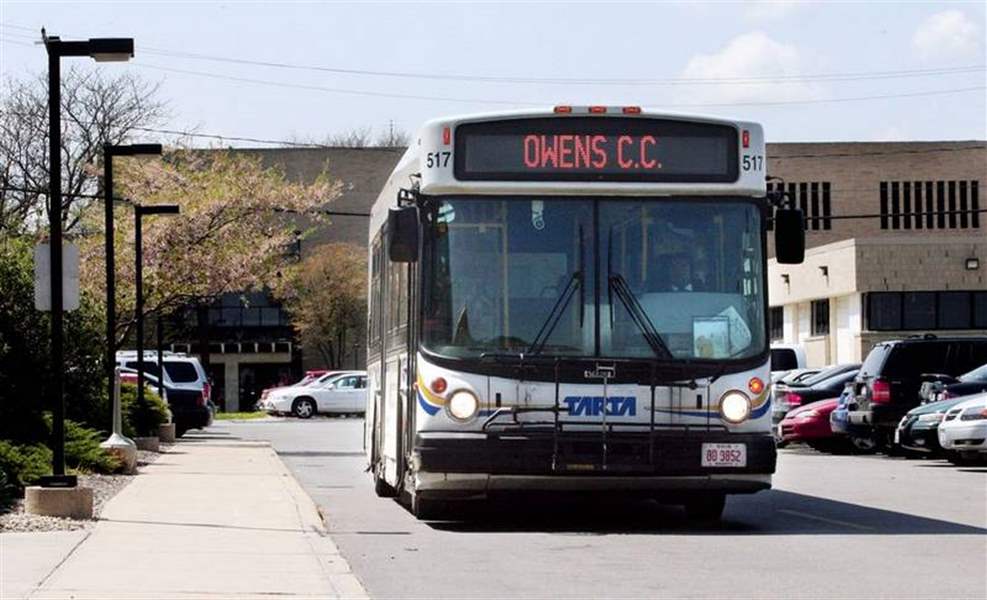
Gas prices hit record $3.65 gallon
4/30/2008
Owens Community College offers bus service for its students.

LaQuanda Brown waits for the bus that will take her to downtown Toledo from the Owens Community College campus.
Driving to class at Owens Community College has never been an option for Mona McBride, who doesn't have a driver's license.
But lately, the buses she rides have been getting a bit more crowded.
"On the bus in the morning, it's hard," she said at lunchtime yesterday while waiting for the Owens shuttle that would take her back to Toledo from the college campus in Perrysburg Township.
"I try to stand right by the bus stop so I can be sure to get a seat."
LaQuanda Brown is one of Ms. McBride's new fellow passengers, and the reason is simple: the price of gasoline, which rose to $3.65 a gallon for self-service, unleaded regular for the first time in the Toledo area.
"The price of gas, I just can't afford it," Ms. Brown said. "This semester, I've stopped driving, and I'm sticking to the bus until it goes back down."
The $3.659 price posted at gas stations throughout the Toledo area was 6 cents higher than the previous peak, $3.599, that was reached last week - although the jump was as much as a quarter or more at some locations.
"$3.65? That's ridiculous. On a minimum-wage job, who can afford that? It's $80 every two weeks," said Brittany Rudebaugh, an Owens student from Northwood who drives to class.

Owens Community College offers bus service for its students.
Ms. Rudebaugh said she plans to rent an apartment that will be close enough to campus to walk "at least on warm days."
Toledo's new prices are close to a national average of $3.61 a gallon that AAA and the Oil Price Information Service reported yesterday morning, and arrived a day after crude oil prices passed the $119 a barrel mark on the New York Mercantile Exchange before falling at the end of the trading day.
Some Michigan stations raised their price to $3.699 a gallon, and a few scattered prices higher than $3.65 were reported south of the state line as well.
Gasoline weeks ago topped the $4 mark in California and Hawaii.
The local record was set on the day when BP and Shell announced record profits, although Valero Energy, North America's refinery, reported a sharp earnings drop because retail prices have not kept up, on a percentage basis, with the rising price of crude.
Unlike BP and Shell, Valero does not have a crude-oil exploration and drilling operation.
Crude fell by more than $3 a barrel on the NYMEX, settling at $115.63 a barrel, oil's lowest settlement since April 17, as commodities traders responded to new data showing declining demand, a stronger dollar, and the end of a refinery strike in Scotland that had cut off production from part of the North Sea oil field.
Part of crude's rising price has been driven by investment demand as a hedge against weakness in the U.S. currency on world markets.
Drivers whose vehicles consume diesel have even paid more for fuel throughout the current price run-up than gasoline users do.
Tobin Klinger, a spokesman for the University of Toledo, said the campus bus system consumes about 20,000 gallons a year.
This month the university paid $4.29 a gallon for diesel, $1.83 more than a year ago - which means that if sustained, current prices will cost the university about $360,000 a year.
Ridership is up by about 5 percent this year, Mr. Klinger said.
While serving a smaller campus with transit, Owens also provides an hourly run to downtown Toledo and back for which it charges no fare.
Daytime service is provided under contract with the Toledo Area Regional Transit Authority, while evening runs use an Owens bus and driver, said John Aleksander, the college's director of buildings and grounds.
The TARTA contract cost Owens $93,000 this school year, up from $90,000 last year, while the college's cost for diesel fuel has gone up by about two-thirds, he said.
Even so, Mr. Aleksander said the bus service is "a positive thing for the community" that Owens provides, and the college is looking at expanding its range to include nearby apartment complexes so that fewer students will drive to class.
James Gee, TARTA's general manager, said it's too soon to know what Owens will be charged when the contract is renewed later this year.
"We adjust that every year and it does reflect our operating cost. Most of the cost is not the fuel, it's the driver," Mr. Gee said.
The soaring price of diesel is enough of a factor that TARTA plans to trim its own service next month.
Where oil prices go from here is a matter of considerable disagreement among analysts.
Jeff Rubin, an analyst at CIBC World Markets, said last week he is troubled by weak production growth in response to rising world crude prices, which "signals a period of unprecedented scarcity."
Oil could exceed $200 a barrel by 2012, he said, which would bring $7-per-gallon gasoline to the United States.
"What is disturbing here is that things seem to get worse, not better," said David Greely, an analyst at Goldman Sachs. "These high prices are not attracting meaningful new supplies.
J. Robinson West, chairman of PFC Energy, an energy consulting firm in Washington, said "The world is not running out of oil, but rather it's running out of oil production capacity. "
But Tom Kloza, the Oil Price Information Service's chief oil analyst, wrote in his Speaking of Oil blog on Friday that he is "still prone to believing that we are not on the threshold of a dreaded new era of manic oil prices" and instead thinks prices are likely to retreat in the near future.
"I still believe we are within 5 percent or so of the likely top for U.S. fuel prices in 2008," Mr. Kloza wrote.
"Crude oil would need to go to $130 to $135 [a barrel] in order to bring the dreaded $4 [a gallon] average into play.
But this could be the dreaded "Black Swan" event where history, observation, and empirical evidence all fail to give reasonable guidance for unexpected development."
Information from The Blade's news services was used in this report.
Contact David Patch at:
dpatch@theblade.com
or 419-724-6094.